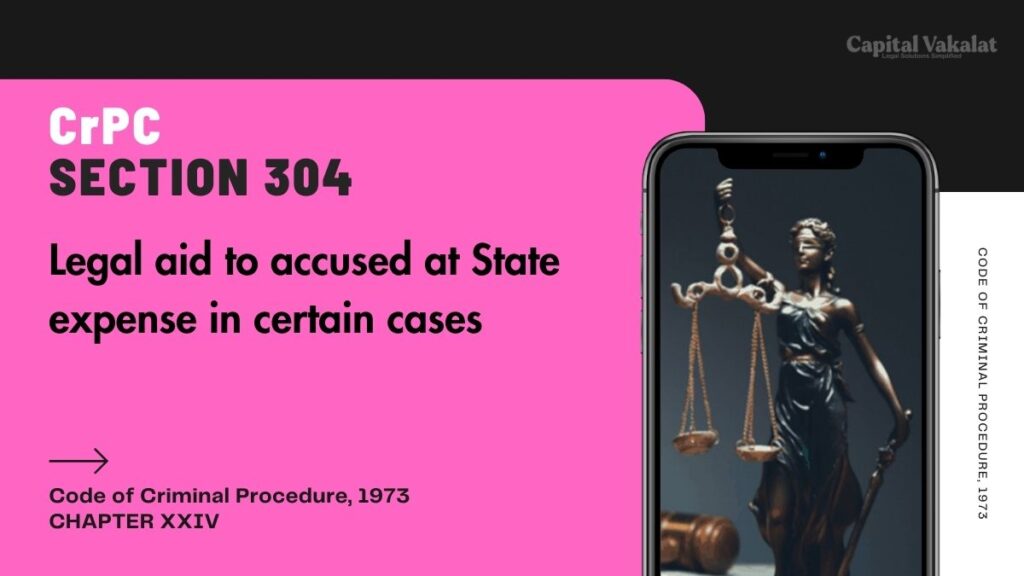The Indian legal system is grounded in the principles of justice and fairness, ensuring that every individual, regardless of their financial status, has the right to a fair trial. Section 304 of the Criminal Procedure Code (CrPC) embodies this principle by mandating legal aid to accused persons at state expense in certain cases.

This provision underscores the commitment to upholding justice by providing necessary legal assistance to those unable to afford it.
Bare Act. Section 304 Cr.P.C.
Legal aid to accused at State expense in certain cases.
(1) Where, in a trial before the Court of Session, the accused is not represented by a pleader, and where it appears to the Court that the accused has not sufficient means to engage a pleader, the Court shall assign a pleader for his defence at the expense of the State.
(2) The High Court may, with the previous approval of the State Government, make rules providing for--
(a) the mode of selecting pleaders for defence under sub-section (1);
(b) the facilities to be allowed to such pleaders by the Courts;
(c) the fees payable to such pleaders by the Government, and generally, for carrying out the purposes of sub-section (1).
(3) The State Government may, by notification, direct that, as from such date as may be specified in the notification, the provisions of sub-sections (1) and (2) shall apply in relation to any class of trials before other Courts in the State as they apply in relation to trials before Courts of Session.
The Importance of Legal Aid for the Accused
Legal aid is a cornerstone of a fair justice system. Without adequate representation, the accused may not receive a fair trial, leading to potential miscarriages of justice. The right to legal aid ensures that the accused can defend themselves adequately, presenting their case effectively before the court. This is particularly crucial in serious criminal cases where the consequences of a conviction can be severe, including long-term imprisonment or even capital punishment.
Historical Context of Section 304 CrPC
The inclusion of Section 304 in the CrPC can be traced back to the need for judicial reforms aimed at making justice accessible to all. Historically, the Indian legal system recognized the disparity between the wealthy and the indigent, with the latter often unable to afford competent legal representation. The codification of this provision was a significant step towards bridging this gap, ensuring that economic disadvantage does not impede one’s access to justice.
Scope and Application of Section 304 CrPC
Section 304 of the CrPC specifically provides for legal aid to accused persons at state expense in certain cases. This provision is applicable in trials before the Sessions Court, which deals with serious offenses. The legal aid is extended to those who do not have sufficient means to hire a defense counsel. The objective is to ensure that the lack of financial resources does not hamper the accused’s ability to mount a defense, thereby maintaining the integrity of the judicial process.
Criteria for Granting Legal Aid
The court determines the eligibility for state-funded legal aid based on the financial status of the accused. If the accused cannot afford legal representation, the court appoints a lawyer at the state’s expense. The process involves an assessment of the accused’s financial condition, often through affidavits and other financial documents. The provision ensures that the right to a fair trial is not compromised due to economic constraints.
Role of the State in Providing Legal Aid
The state plays a pivotal role in implementing Section 304 CrPC. This includes the appointment of qualified defense attorneys to represent the indigent accused. The state is also responsible for ensuring that these appointed attorneys are adequately compensated, maintaining the quality of legal representation provided. This not only ensures compliance with the legal mandate but also reinforces the state’s commitment to upholding justice and fairness.
Challenges in Implementing Section 304 CrPC
Despite the clear provisions, the implementation of Section 304 CrPC faces several challenges. One of the primary issues is the availability of qualified legal practitioners willing to take up state-funded cases, often due to inadequate compensation. Additionally, there is sometimes a lack of awareness among the accused about their rights to legal aid. Addressing these challenges requires concerted efforts from the judiciary, legal fraternity, and government authorities.
Case Studies Highlighting the Impact of Section 304 CrPC
Numerous case studies illustrate the impact of Section 304 CrPC in ensuring justice. For instance, in several high-profile cases, indigent accused individuals were provided competent legal representation, leading to fair trials and just outcomes. These cases highlight the importance of legal aid in protecting the rights of the accused and ensuring the proper functioning of the judicial system.
Future Prospects and Recommendations
To enhance the effectiveness of Section 304 CrPC, several measures can be undertaken. This includes increasing the compensation for state-appointed defense attorneys, thereby attracting more qualified professionals to take up such cases. Additionally, raising awareness about the right to legal aid among the accused and ensuring prompt and efficient appointment of defense counsel can significantly improve the implementation of this provision.
Conclusion
Section 304 of the CrPC, which provides for legal aid to accused persons at state expense, is a critical component of the Indian legal system. It ensures that justice is not denied due to economic disparities, upholding the fundamental right to a fair trial. While there are challenges in its implementation, concerted efforts can address these issues, reinforcing the commitment to justice and equality.